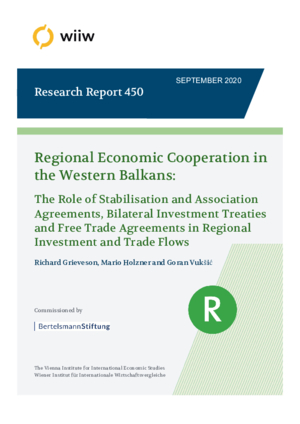Regional Economic Cooperation in the Western Balkans: The Role of Stabilisation and Association Agreements, Bilateral Investment Treaties and Free Trade Agreements in Regional Investment and Trade Flows
Richard Grieveson, Mario Holzner and Goran Vukšić
wiiw Research Report No. 450, September 2020
55 pages including 23 Tables and 8 Figures
In this report we present the results of our econometric investigation of the role of (1) stabilisation and association agreements (SAAs), (2) bilateral investment treaties (BITs) and (3) free trade agreements (FTAs) in the Western Balkans and their impact on the region’s inward foreign direct investment (FDI) and exports, with primary interest in the effects on intra-regional FDI and trade. We find that BITs were generally not related to intra-regional FDI (nor to the FDI from other countries). However, in a separate discussion of Serbian FDI into Montenegro we argue that the corresponding BIT between the two countries may have been an exception. The Central European Free Trade Agreement (CEFTA) contributed to increased intra-regional trade. This effect is stronger if Serbia is left out of the analysis, which may be due to the diversion of Serbian exports to the EU over the same period, possibly also facilitated by Serbia’s SAA with the EU. If all regional FTAs are “merged” with CEFTA and assessed as a single variable, its impact on exports is not significant, unless Serbia is left out of the analysis. This indicates that the early intra-regional FTAs, which were replaced by CEFTA, were weakly implemented and did not contribute significantly to stronger trade integration in the region. Finally, we find that SAAs turn out to be highly significant for FDI from the EU to signee countries, as well as for exports from these countries to the EU.
Disclaimer:
The following background study was written in the context of a joint project conducted by wiiw and the Bertelsmann Stiftung. The project examined whether, and if so how successful, the EU strategy has been in promoting rapprochement and reconciliation through regional cooperation in the Western Balkans. The overall results of the project were published under the title 'Pushing on a string? An evaluation of regional economic cooperation in the Western Balkans'.
Keywords: Free Trade Agreements, Bilateral Investment Treaties, Economic Cooperation, Western Balkans
JEL classification: F13, F14, F21, F53
Countries covered: Albania, Bosnia and Herzegovina, Kosovo, Montenegro, North Macedonia, Serbia, Western Balkans
Research Areas: International Trade, Competitiveness and FDI
